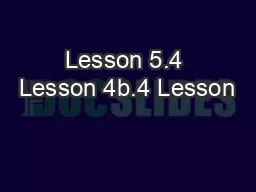PPT-Greek Lesson 1
Author : kittie-lecroy | Published Date : 2017-08-27
Vocabulary 12 total Lesson 1 Vocabulary 1 Anthropology noun the science of human beings the study of human beings in relation to distribution origin and relationships
Presentation Embed Code
Download Presentation
Download Presentation The PPT/PDF document "Greek Lesson 1" is the property of its rightful owner. Permission is granted to download and print the materials on this website for personal, non-commercial use only, and to display it on your personal computer provided you do not modify the materials and that you retain all copyright notices contained in the materials. By downloading content from our website, you accept the terms of this agreement.
Greek Lesson 1: Transcript
Download Rules Of Document
"Greek Lesson 1"The content belongs to its owner. You may download and print it for personal use, without modification, and keep all copyright notices. By downloading, you agree to these terms.
Related Documents














